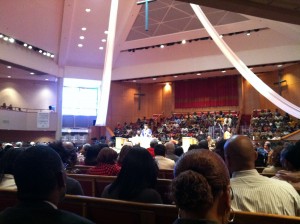18 Oct, 2011
 While in Chicago this past week, I had the pleasure of visiting Trinity UCC. Despite several decades of ardent work in social justice and community building on the South Side, Trinity is perhaps best known today as the home of former senior pastor Rev. Dr. Jeremiah Wright and as Obama’s former church. Sadly, those polarized connotations often distract from the great work that Trinity continues to do. Today, Trinity is under the helm of Rev. Otis Moss III, who is a graduate of my beloved Yale Divinity School and an inspirational preacher.
While in Chicago this past week, I had the pleasure of visiting Trinity UCC. Despite several decades of ardent work in social justice and community building on the South Side, Trinity is perhaps best known today as the home of former senior pastor Rev. Dr. Jeremiah Wright and as Obama’s former church. Sadly, those polarized connotations often distract from the great work that Trinity continues to do. Today, Trinity is under the helm of Rev. Otis Moss III, who is a graduate of my beloved Yale Divinity School and an inspirational preacher.
In addition to one of the most incredible worship services I have experienced, Trinity also inspired me through their environmental practices. In most communities that I visit, I have to search for any environmental concerns, actions, or the like. At Trinity, I could not avoid it. In a prominent position in the bulletin, there is an invitation to join the Green Committee along with an extensive description of both the committee’s activities and a community member you can talk to get more information. In case you miss it in the bulletin, this green ministry is also part of the regular announcements and prominent on the website’s homepage.
On top of all the great activities available through the Green Ministry and Green Committee programs, Trinity also has a unique practice that is a model of modern Sabbath. On Wednesdays, the entire congregation turns off their cell phones from 12-1pm and from 7-8pm. These periods of rest raise awareness of energy use while bringing attention to the metals that are used in our electronics. Those metals are the source of extraordinary suffering in the regions where they are mined, such as the Democratic Republic of the Congo. In addition, this practice brings a period of mindful rest to the parishioners in the middle of the week. For more on the mining of “Bloody Coltan” (Columbite-tantalite) and the “Cell Out” campaign, see: http://www.trinitychicago.org/index.php?option=com_content&task=view&id=141&Itemid=40 . I find this practice one of the most inspirational of any I’ve witnessed on the trip thus far. Thank you, Trinity, for showing us all how it can be done!

Thanks to Adrienne Wynn and the Green Ministry folks at Trinity for making me feel so welcome and for sharing your time!
Trinity’s primary focus in environmental practices is food. Across the street from their main building, Trinity has a community garden where children and adults have an opportunity to grow food while also learning about gardening practices and dietary issues. This is in direct response to the “food deserts” that are a part of impoverished areas throughout the country. They are also a way of raising awareness of acts of environmental racism that leave many African American communities exposed to toxic chemicals, power lines, and a number of other harmful byproducts of society’s needs that disproportionately affect people of color. For more on Trinity’s green practices, see the links below:
http://vidego.streamingfaith.com/player.php?p=ee9x954m
http://vidego.streamingfaith.com/player.php?p=unr5g5n0
or contact [email protected]
I left Trinity feeling inspired and informed. While many churches talk about environmental concerns, Trinity is putting their ideas into practice in a way that benefits the lives of the community, the health of their neighbors, and the state of the planet. They do so in a way that takes into account their specific setting, challenges, and potential. In that way, they are a model for contemporary Christian communities everywhere.
Until we meet again
More healthy in community
Than we thought possible


